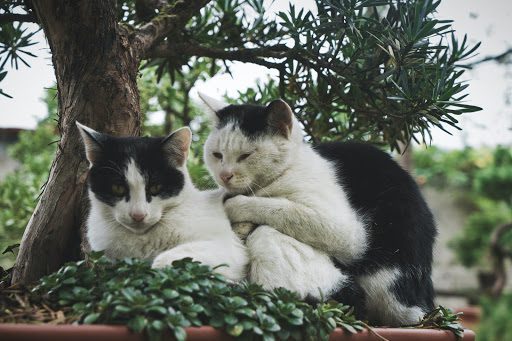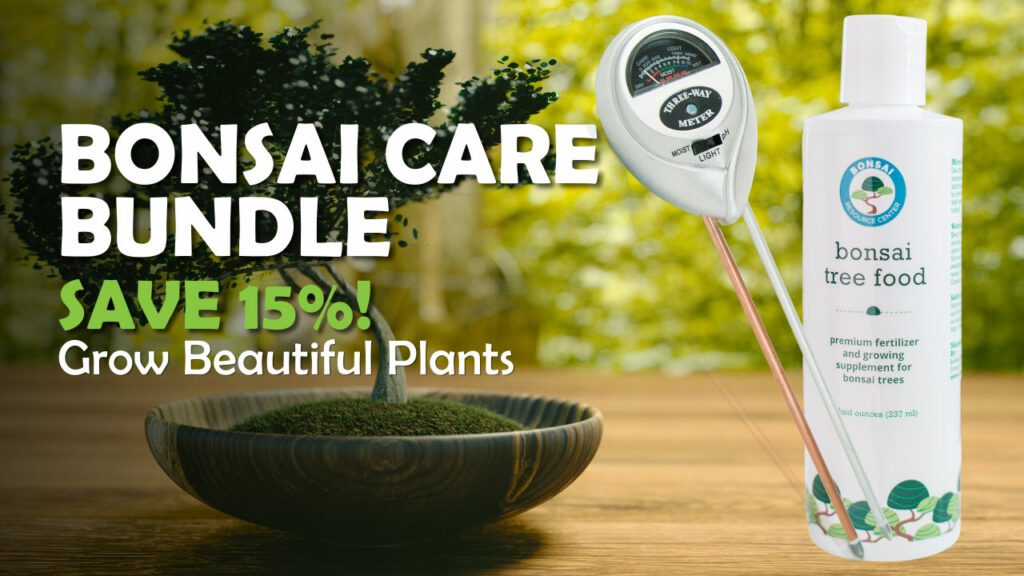Learning how to grow bonsai is an exciting and rewarding challenge. New owners often have questions about bonsai tree care, but another common question concerns the safety of a furrier roommate.
Is My Bonsai Tree Safe for Cats?
Felines are notorious for nibbling on unattended greenery. In the wild, they may consume plants for nutrients or fiber. Your housecat might just be bored or curious. Aside from the fact that your bonsai tree probably doesn’t like being snacked on, many varieties can be poisonous to your cat.
Whether your cat is plant crazy or shows no interest at all, it’s always smart to do your research. Before bringing a new breed into your home, you’ll want to ensure it’s a safe bonsai tree for cats.
This toxic and nontoxic plant list from the ASPCA is a great resource.
Best Bonsai Trees for Cats
There’s no cut-and-dried method for choosing the best bonsai tree for cats. While many people report their cat and bonsai cohabitate together just fine, not many breeds come with a 100% feline-friendly guarantee. That’s because even fairly harmless breeds can be toxic when consumed in large amounts.
Regardless, a number of varieties are generally accepted as pet-safe. While you should always consult with your vet or the nursery staff, the following trees are widely considered the safest options.
- Parlour palm
- Money tree
- Bamboo palm
- Ponytail palm
- Peperomia green
- Prayer plant
Grower Beware: Bamboo balm bonsai is sometimes confused with Lucky Bamboo, a popular plant in feng shui. Lucky Bamboo is toxic and should not be kept within reach of pets.
What if my cat doesn’t eat plants?
Even if your cat has never had an appetite for greenery, you should keep toxic plants out of reach. Depending on the level of toxicity, a single instance can be tragic. This doesn’t mean all risky plants are off the table, you’ll just need to take a few extra steps to keep your cat safe. (We’ll get into this later.)
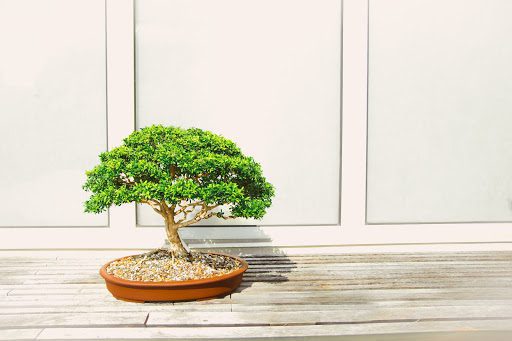
Worst Bonsai Trees for Cats
With the proper care, almost any type of tree can be grown as a bonsai. Unfortunately, many of the most popular bonsai tree breeds are toxic for cats—some are even fatal. The following list contains a few common high-risk varieties.
Sago Palm Tree
Sago palm bonsai are adored for their curious pineapple shape and fan-like leaves. This low-maintenance breed may make beginners rejoice, but cat owners beware: sago palm is one of the most poisonous bonsai trees for cats. The toxic culprit here is cyasin, which can lead to liver failure if ingested. All parts of the plant contain this toxin and are highly fatal to felines
Jade Plant
Jade plants are a popular, easy-to-grow bonsai tree. They’re also designated as poisonous to pets by the ASPCA While it’s relatively uncommon for cats to eat jade, prolonged exposure to the plant’s toxins can be fatal. As part of your bonsai tree care routine, examine your jade plant’s leaves for teeth marks (and always keep an eye out for changes in your cat’s behavior).
Azalea Bonsai
With dainty pink flowers and serpentine trunks, azalea are considered by many the quintessential bonsai tree. Unfortunately, this breed is highly toxic to cats—and not just when flowering. Because all parts of the Azalea are considered poisonous, this tree is dangerous for cats year-round. As small as .2% of your pet’s body weight can result in poisoning
Boxwood Bonsai
The hardy and fast-growing boxwood makes an excellent bonsai. However, a combination of alkaloids and a butterlike oil make this tree highly toxic to cats While the boxwood bonsai’s bitter taste often deters feline nibbles, it can be fatal in large doses.
Other Dangerous Bonsai Trees for Cats
- Plum
- Cherry
- Fig
- Ficus
- Wysteria
Although these are the most common toxic bonsai, this list is by no means exhaustive. This ASPCA list of toxic and nontoxic plants is an excellent resource for determining if a new bonsai tree is safe for your cat.
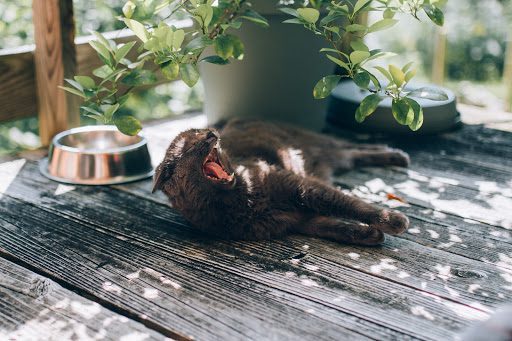
How to Keep Your Cat Away From Bonsai Trees
If you have your heart set on one of the species listed above, don’t despair! There are plenty of ways to cultivate your love of bonsai while keeping your furry friends safe.
- First, if you want to keep a bonsai tree within reach of your cat, choose a feline-friendly species! Always ask a nursery attendant about a new tree’s toxicity and research the species yourself.
- For indoor cat owners, choose a bonsai you can grow outdoors. If you have outdoor cats, keep your bonsai inside and out of reach.
- Elevate and separate. Many growers display their bonsai collections on high shelves or hanging platforms. Just be sure to check for any furniture that could help acrobatic felines get somewhere they shouldn’t be.
- Establish a pet-free space. Dedicating part of your home to bonsai care adds to the meditative nature of the art form. While this may not be possible for everyone, a greenhouse or study makes an excellent bonsai sanctuary.
- Distract and conquer. Get Garfield something else to nibble on: catnip, silvervine, and cat thyme are not only safe, they’re healthy!
Symptoms of Bonsai Tree Poisoning
Toxic chemicals in bonsai trees can cause a variety of effects If your cat has ingested part of a toxic tree, he may show the following symptoms:
- Vomiting
- Lethargy
- Diarrhea
- Drooling
- Loss of appetite
- Seizures or coma
The range of symptoms is why it is essential to know the toxicity of any plant you bring into your home. If your cat is showing any of these symptoms, or if your tree appears to have been chewed on, contact your vet or pet poison control hotline immediately.
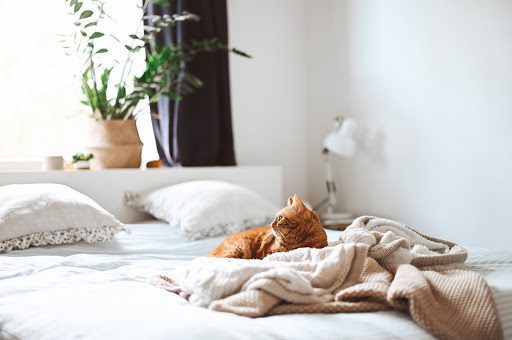
Bonsai Trees for Cats: Conclusion
Bonsai tree care and cat safety are not mutually exclusive. With a little foresight and strategic planning, you can have both of these wonderful companions in your life for the long haul.
Join the Bonsai World
At The Bonsai Resource Center, our goal is to equip you with everything you need to grow and maintain a truly beautiful bonsai tree. This is our passion, and we want it to be yours as well! Whether you are a bonsai beginner or are looking to hone your skills, check out our other articles and visit our shop for all your bonsai needs. And connect with other bonsai lovers in our Facebook Group—we look forward to seeing you there!
You can also explore our extensive resources for bonsai tree care, including:
- The Ultimate Guide to Bonsai Tree Fertilizer
- 5 Easy Tips to Master Advanced Bonsai Care
- How to Identify 13 Common Bonsai Pests
Sources

